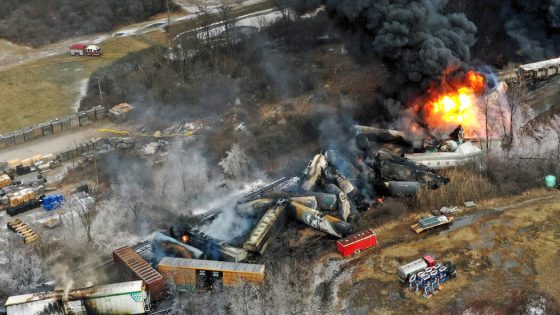Norfolk Southern has agreed to pay more than $310 million to settle claims and cover costs stemming from the February 2023 derailment of a freight train carrying hazardous materials in an Ohio town, the federal government said on Thursday.
The Department of Justice and the Environmental Protection Agency said the settlement, which still needs to be approved by a federal court, would require Norfolk Southern to improve rail safety and pay for cleanup costs and health and environmental monitoring in and around East Palestine, Ohio, where the accident happened.
On a Friday night in early February last year, 38 rail cars on a Norfolk Southern train derailed, 11 of which were carrying hazard materials like vinyl chloride, a chemical used to make plastics. Days later, emergency responders, fearing an explosion, decided to release and burn vinyl chloride from derailed cars, sending vast plumes of dark smoke over the town. Hundreds of residents were evacuated, and life in East Palestine was upended for months. There were no deaths.
Michael S. Regan, the administrator of the E.P.A., said the settlement ensured that the cleanup would be paid for by the company and help prevent similar disasters.
“I committed to restoring the health and safety of the community, and I committed to holding Norfolk Southern accountable for the disaster it inflicted on the people of East Palestine and surrounding communities,” Mr. Regan said on a call with reporters. “And, folks, I am proud to say that today we are following through on those commitments.”
The biggest part of the settlement is an estimated $235 million to cover past and future costs relating to the environmental cleanup. About $15 million is a civil penalty related to claims that the railroad violated the Clean Water Act. Norfolk Southern did not admit liability in the settlement.
“We are pleased we were able to reach a timely resolution of these investigations that recognizes our comprehensive response to the community’s needs and our mission to be the gold standard of safety in the rail industry,” Alan H. Shaw, chief executive of Norfolk Southern, said in a statement.
The company said that it had already set aside money to cover the costs of the settlement. Overall, it expects to pay out $1.7 billion, a sum that includes a $600 million settlement of a class-action suit brought by residents and businesses that was announced last month.
The accident highlighted the dangers that freight trains pose and shined a harsh light on the rail industry’s safety practices. Investigators believe the Norfolk Southern train derailed after a wheel bearing overheated. Railroads place detectors on tracks to identify overheating bearings and alert employees to stop trains to prevent accidents. But the East Palestine train didn’t pass such a detector for nearly 20 miles, which meant that its overheated bearing was not identified in time.
Last year, lawmakers introduced a bill to bolster railway safety that, with some exemptions, requires minimum distances between detectors. But the legislation has not advanced in Congress amid stiff opposition from the industry.
Mr. Regan said the safety measures set forth in the Norfolk Southern settlement were informed by the legislation. It will require Norfolk Southern to have hot-bearing detectors 15 miles apart on tracks that commonly transport hazardous materials, which would cover a large part of the company’s network. The bill in Congress, with some exceptions, demands detectors every 15 miles on mainline tracks.
On a call with reporters, Mr. Regan said the safety measures were a “game changer.” And he contended that Norfolk Southern’s application of the measures would show that they were “doable, cost effective and technologically sound.”
The E.P.A. and Justice Department said Norfolk Southern’s safety improvements would cost over $200 million, an amount that is not included in the $310 million settlement. Norfolk Southern announced a safety plan soon after the derailment in which it said it would install approximately 200 hot bearing detectors.
Under the settlement, the railroad will spend $25 million over 20 years on a community health program, the bulk of which will be spent on medical monitoring. But the program will not cover the cost of treatments that might follow testing.
“Medical monitoring is not enough,” said Jess Conard, a speech-language pathologist who has worked as an activist in the East Palestine area since the derailment. “We need to be reassured that our exams, our treatments and any follow-up services will not make us go bankrupt.”
David M. Uhlmann, the assistant administrator in the E.P.A.’s enforcement office, said in an interview that the laws that formed the basis of the settlement — the Superfund law and the Clean Water Act — do not give the government the authority to recover health care costs.
The settlement does not resolve all regulatory and legal challenges faced by Norfolk Southern.
The state attorneys general for Ohio and Pennsylvania are still scrutinizing the company, and next month the National Transportation Safety Board will release its final report on the accident, which is expected to include recommendations for new safety regulations.
Before the accident, Norfolk Southern’s safety record had been deteriorating. But its accident rate improved markedly last year while those of other large U.S. freight railroads worsened.
Source Agencies



